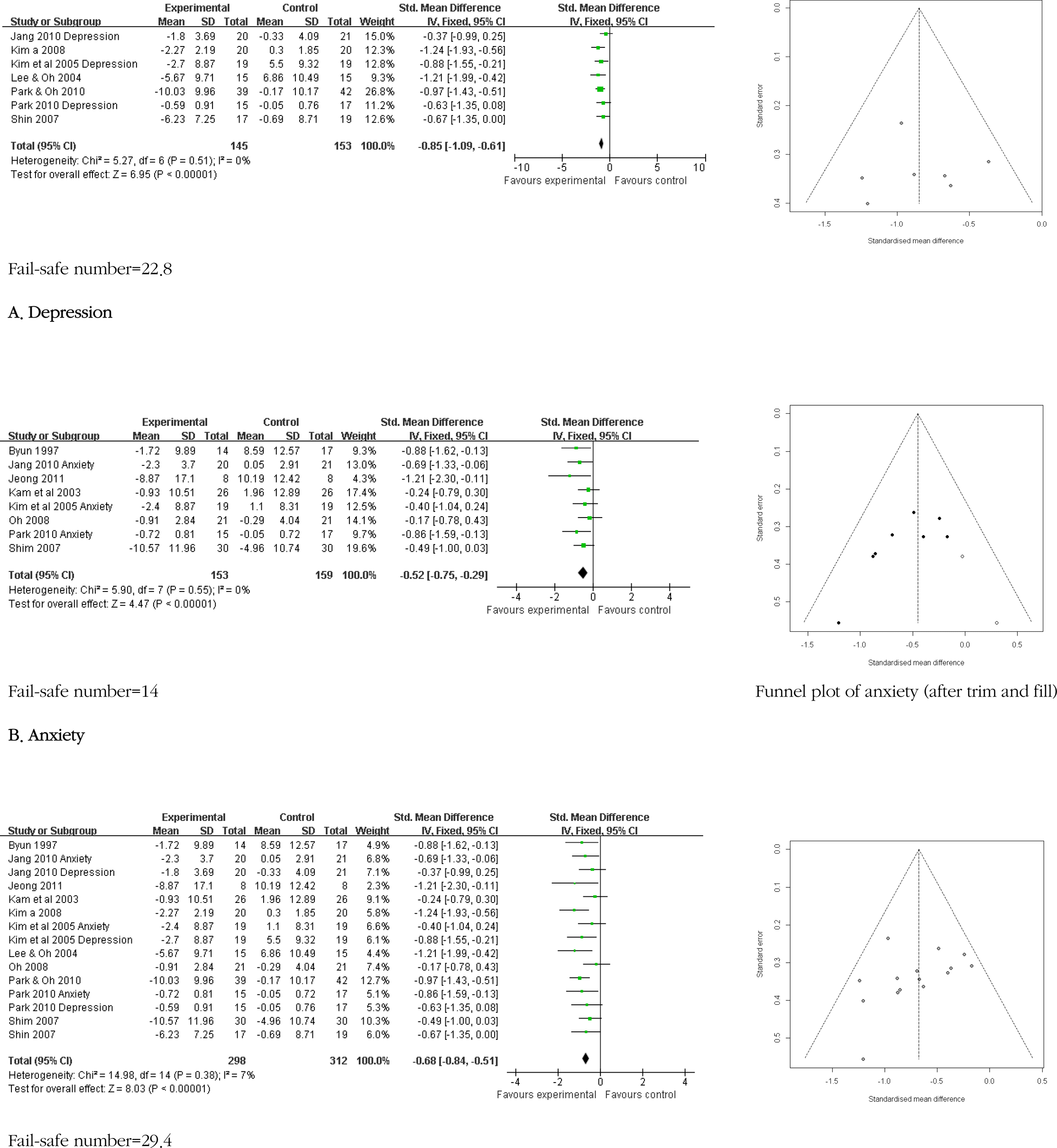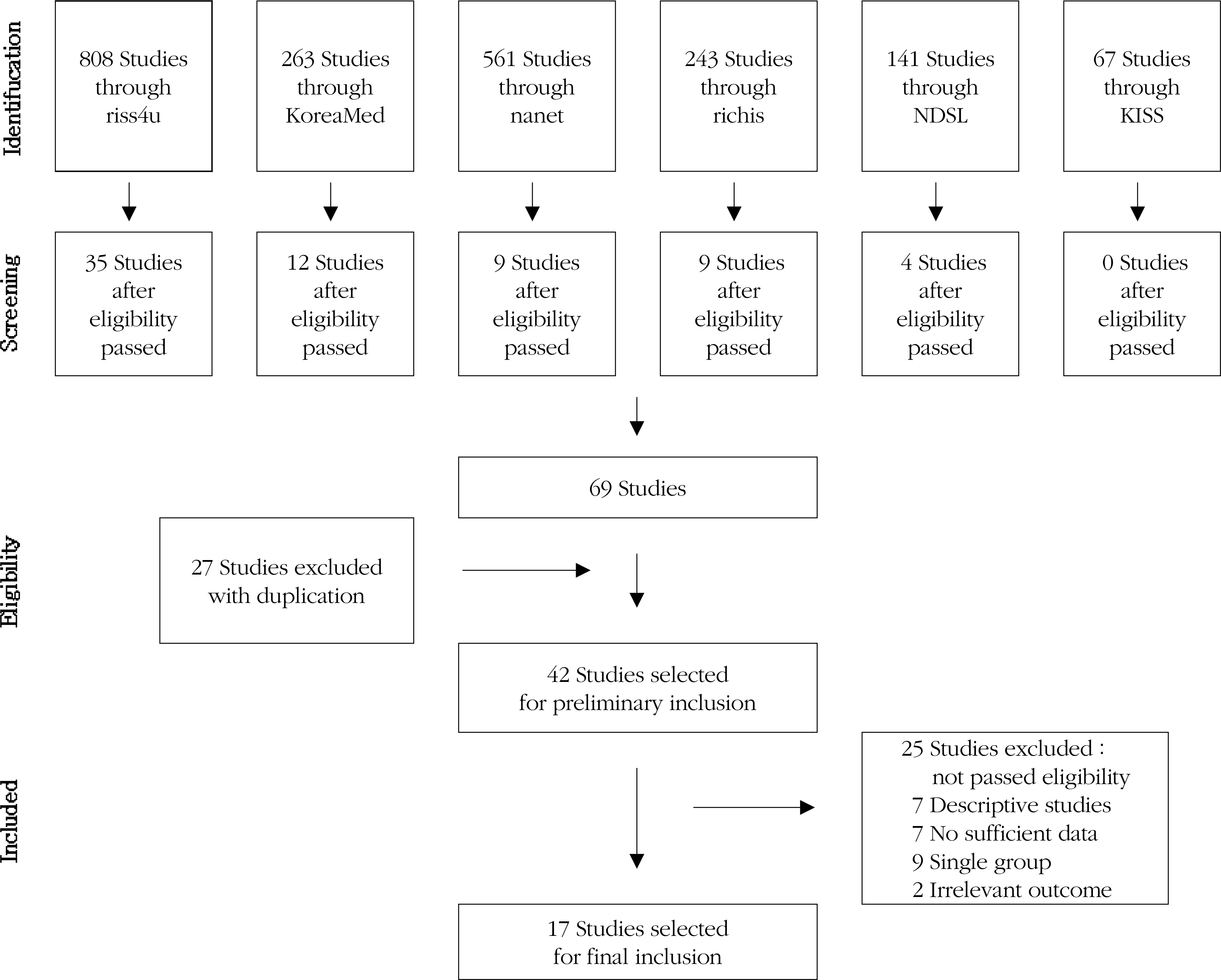Abstract
Purpose
The purpose of this study was to assess the effects of cognitive behavioral therapy (CBT) on depression, anxiety, self care behavior and quality of life in cancer patients.
Methods
Two thousand and eighty three abstracts were identified through six electronic databases (1980 to June 2012) in Korea. Seventeen studies involving 679 participants met the inclusion criteria for meta analysis. Two authors independently assessed trial quality by Cochrane's Risk of Bias and Methodological Items for Non Randomized Studies and extracted data. The data were analyzed by the RevMan 5.2 program of Cochrane library.
Results
Overall, study quality was moderate to high. CBT was conducted for a mean of 4.2 weeks, 7 sessions and an average of 36.1-minutes per session. CBT was effective for depression (d=-0.85; 95% CI=-1.09, -0.61), anxiety (d=-0.52; 95% CI=-0.75, -0.29), self care behavior (d=-1.34; 95% CI=-1.93, -0.74), and quality of life (d=-0.42; 95% CI=-0.80, -0.04). Publication bias was not detected as evaluated by funnel plot and Egger's test.
Go to : 
REFERENCES
Cohen J.1988. Statistical power analysis for the behavioral science. 2nd ed.Hillsdale, NJ: Lawrence Erlbaum Associates.
Egger M.., Smith G. D.., Schneider M.., Minder C.1997. Bias in meta-analysis detected by a simple graphical test. British Medical Journal. 315:629–634. http://dx.doi.org/10.1136/bmj.315.7109.629.

Galway K. M.., Black A.., Cardwell C. R.., Mills M.., Donnelly M.2008. Psychosocial interventions to improve quality of life and emotional wellbeing for recently diagnosed cancer patients. (protocol). Cochrane Database of Systematic Reviews, 2. http://dx.doi.org/10.1002/14651858.
Goedendrop M. M.., Gielissen M. F.., Verhagen C. A.., Bleijen-berg G.2009. Psychosocial intervention for reducing fatigue during cancer treatment in adults. Cochrame Database of Systemic Review. 1:http://onlinelibrary.wiley.com/doi/10.1002/14651858.CD006953.pub2/pdf.
Goodinson S. M.., Singleton J.1989. Quality of life: A critical review of current concepts, measures and their clinical implication. International Journal of Nursing Studies. 26:327–341.
Hersch J.., Juraskova I.., Price M.., Mullan B.2009. Psychosocial interventions and quality of life in gynecological cancer patients: A systematic review. Psychological Oncology. 18:795–810.
Hodges L. J.., Walker J.., Kleiboer A. M.., Ramirez A. J.., Richardson A.., Velikova G., et al. 2011. What is a psychological intervention? A metareview and practical proposal. Psychological Oncology. 20:470–478. http://www.ncbi.nlm.nih.gov/pubmed/20878870.

Jassim G. A.., Whitford D. L.., Grey I. M.2010. Psychological interventions for women with non-metastatic breast cancer (Protocal). Cochrane Database of Systematic Reviews. 10:http://onlinelibrary.wiley.com/doi/10.1002/14651858.CD008729/full.
Kim J. N.., Lee R.2008. A review of research on the psychosocial interventions for the cancer patients. Korean Journal of Health Psychology. 13:329–357.
Kim S. Y.., Park J. E.., Seo H. J.., Lee Y. J.., Son H. J.., Jang B. H., et al. 2011. NECA's guidance for undertaking systematic reviews and meta-analysis for intervention. Seoul: National Evidence-based Healthcare Collaborating Agency.
Meyer T. J.., Mark M. M.1995. Effects of psychosocial interventions with adult cancer patients: A meta-analysis of randomized experiments. Health Psychology. 14:101–108.

National Cancer Information Center. 2013, January. Cancer statistics. Retrieved January 30, from. http://www.cancer.go.kr/ncic/cics-f/03/032/index.html.
Newell S.., Sanson-Fisher R. W.., Savolainen N. J.2002. Systematic review of psychological therapies for cancer patients: Overview and recommendations for future research. Journal of the National Cancer Institute. 94:558–584.

Oh P. J.., Choi H. J.2012. The effect of patient education interventions on distress, self-care knowledge and self-care behavior of oncology patients: A meta-analysis. Asian Oncology Nursing. 12:257–266.

Oh P. J.2010. An integrative review of oncology nursing research in Korea: 2003-2008. Journal of Korean Oncology Nursing. 10:80–87.
Oh S. S.2009. Meta-analysis: Theory and practice. Seoul: Konkuk University Press.
Osborn R. L.., Demoncada A. C.., Feuerstein M.2006. Psychosocial interventions for depression, anxiety, and quality of life in cancer survivors: Meta-analyses. International Journal of Psychiatry in Medicine. 36:13–34.

Raingruber B.2011. The effectiveness of psychosocial interventions with cancer patients: An integrative review of the literature (2006-2011). International Scholarly Research Network Nursing;http://dx.doi.org/10.5402/2011/638218.
Ranchor A. V.., Fleer J.., Sanderman R.., Van der Ploeg K. M.., Coyne J. C.., Schroevers M.2012. Psychological interventions for cancer survivors and cancer patients in the palliative phase. Cochrane Database of Systematic Reviews. 10:http://onlinelibrary.wiley.com/doi/10.1002/14651858.CD009511/abstract?deniedAccessCustomisedMessage=&userIsAuthenticated=false.

Rehse B.., Pukrop R.2003. Effects of psychosocial interventions on quality of life in adult cancer patients: Meta analysis of 37 published controlled outcome studies. Patient Education and Counseling. 50:179–186.

Schneider S.., Moyer A.., Knapp-Oliver S.., Sohi S.., Cannelia D.., Targhetta V.2010. Pre-intervention distress moderates the efficacy of psychosocial treatment for cancer patients: A meta-analysis. Journal of Behavioral Medicine. 33(1):1–14. http://dx.doi.org/10.1007/s10865-009-9227-2.

Sheard T.., Maguire P.1999. The effect of psychological interventions on anxiety and depression in cancer patients: Results of two meta-analyses. British Journal of Cancer. 80:1770–1780.

Schwarzer G.2013. Meta: Meta-analysis with R. R package version 2.15.3. http://CRAN.R-project.org/package=meta.
Uitterhoeve R. J.., Vernooy M.., Litjens M.., Potting K.., Bensing J.., Mulder P. D., et al. 2004. Psychosocial interventions for patients with advanced cancer-a systematic review of the literature. British Journal of Cancer. 91:1050–1062.
Go to : 
 | Figure 2.Forest plot of effect size and 95% CI by cognitive behavioral therapy on psychological distress. |
 | Figure 3.Forest plot of effect size and 95% CI by cognitive behavioral therapy on self-care. |
 | Figure 4.Forest plot of effect size and 95% CI by cognitive behavioral therapy on quality of life. |
Table 1.
Characteristics of Included Studies (N=17)
| ID | Design | Subject (stage) | Sample size | Scale | Interventions | Source | Outcomes | Direction of effect | ||
|---|---|---|---|---|---|---|---|---|---|---|
| Exp. (n) | Con. (n) | Name/Type | Weeks/Number of Sessions /Min | |||||||
| Kam et al (2003) | NRCCT | Cancer patients | 26 | 26 | Oh et al (2007)'s scale/ STAI | Self efficacy promoting program/individual | 2/2/25 | Master's (nursing) | Self efficacy/ self care/anxiety | +/+/No diff |
| Shin (2007)† | RCT | Cancer patients (home based) | 17 | 19 | Miller's hope scale/hope index scale from nursing outcomes classification/ Zung (1965)'s depression scale | Hope intervention/ individual | 8/8/40 | Master's (nursing) | Hope/hope index/ depression | +/+/No diff |
| Tae & Youn (2006) | NRCCT | Cancer patients | 15 | 15 | Hearth (1991)'s hope scale/ Youn (1997)'s QOL scale | Forgiveness nursing intervention program/individual | 1/4/60 | Journal (nursing) | Hope/quality of life | +/+ |
| Kim et al (2008)† | RCT | Cancer patients (home based) | 20 | 20 | Nowtony (1989)'s hope scale/ Index scale from nursing outcomes classification/ Cella (1993)'s functional assessment cancer therapy- general QOL | Hope intervention/ individual | 6/6/40~60 | Journal (nursing) | Hope/hope index/ quality of life | +/+/No diff |
| Ko & Park (2011)|| | NRCCT | Breast cancer patients | 17 | 22 | Sherer's self efficacy scale/ Song's self efficacy scale/ Dodd's self care scale/ Tae's QOL scale | Self efficacy promoting program/individual and group | 4/6/21 | Journal (nursing) | General self efficacy/ specific self efficacy/ self care behavior/ quality of life | No diff/+/No diff/ No diff |
| Lee (2006)|| | NRCCT | Lung cancer patients | 12 | 16 | Jang (1996)'s QOL scale | Programs using strategies for promoting self efficacy/group | 4/4/2 | Journal (nursing) | Knowledge/ self efficacy/ quality of life | +/+/No diff |
| Lee & Oh (2004)ठ| NRCCT | Cancer patients (stage 1-2) | 15 | 15 | BDI/STAI | Guided imagery program | 1/6/15 | Journal (nursing) | Anxiety/depression | -/No diff |
| Kim a (2008) | NRCCT | Cancer patients (stage 1-3) | 20 | 20 | Yesavage (1986)'s depression scale/Oh, Song, Kim (1998)'s sleep scale | Guided imagery with visual screen/individual | 1/12/18 | Master's (nursing) | Depression/sleep | -/+ |
| Byun (1997) | NRCCT | Cancer patients (stage 1-4) | 14 | 17 | Rhodes's index of nausea and vomiting/STAI | Guided imagery program/individual | 2/11/15 | Master's (nursing) | Nausea & vomiting/ anxiety | No diff/- |
| Oh (2008)‡|| | NRCCT | Cancer patients (stage 1-4) | 21 | 21 | HADS | Spirituality/ hope promoting program/individual and group | 4/4/30~50 | Journal (nursing) | Fighting spirit/ helplessness/ anxiety/self-care | +/-/No diff/+ |
| Jeong (2011)§ | NRCCT | Cancer patients (stage 1-4) | 8 | 8 | STAI/BAI/PPI/VAS | Mindfulness-based stress reduction program/group | 8/8/90 | Master's (non- nursing) | Anxiety/pain/ blood pressure/pulse | -/-/-/- |
| Kim b (2008) | NRCCT | Gastric cancer patients | 20 | 22 | Sherer& Maddux (1982)'s self efficacy scale/Oh (1997)'s self care scale/Tae et al (2002)'s QOL scale | Web based self-efficacy promoting program/individual and group | 6/6/25 | Doctoral (nursing) | General self-efficacy/ specific self-efficacy/ self-care behavior/ body weight/BMI/ quality of life | +/+/+/-/+/+ |
| Kim et al (2005) | NRCCT | Cancer patients | 19 | 19 | STAI/BDI/Nowotny (1989)'s hope scale/Jang (1993)'s QOL scale | Guided imagery program/individual | 5/14/45 | Journal (nursing) | Anxiety/depression/ quality of life/ hope | No diff/-/No diff/+ |
| Park (2010)ठ| NRCCT | Cancer patients | 15 | 17 | Park (2006)'s mindfulness scale/Hayes et al (2004)'s AAQ;acceptance&action questionnaire-16/ Kim (2006)'s clinging scale/ SCL-90-R/EORTC QLQ-C30 | Meditation and group counseling/group | unclear/unclear /3night 4days | Journal (non-nursing) | Mindfulness/ acceptance behavior/ cling/ anxiety/ depression/hostility/ quality of life/ somatization | +/+/-/-/-/-/ No diff/ No diff |
| Shim (2007)ठ| NRCCT | Leuemia patients | 30 | 30 | VAS/STAI/Blood test | Imagery therapy/ individual | 4/12/13 | Master's (nursing) | Stress/state anxiety/ anxiety/ WBC/ ANC/ lymphocyte | -/No diff/-/-/-/+ |
| Jang (2010)∗ | RCT | Breast cancer patients | 21 | 21 | PKPCT/HADS/Fact-B | Meditation program/ group | 8/8/60 | Doctoral (nursing) | Power/Anxiety/ Depression/ quality of life | +/-/-/+ |
| Park & Oh (2010)§|| | NRCCT | Cancer patients | 39 | 42 | SCL-90-R/Nowontny (1989)'s scale/ C-QOL | Psychosocial intervention/individ ual and group | 8/8/60 | Journal (nursing) | Depression/hope/ quality of life | -/+/+ |




 PDF
PDF ePub
ePub Citation
Citation Print
Print



 XML Download
XML Download